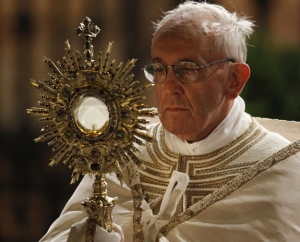Devotion to the Sacrament of the Eucharist

The practice of eucharistic adoration
With the Synod Assembly, therefore, I heartily recommend to the Church’s pastors and to the People of God the practice of eucharistic adoration, both individually and in community. (194) Great benefit would ensue from a suitable catechesis explaining the importance of this act of worship, which enables the faithful to experience the liturgical celebration more fully and more fruitfully. Wherever possible, it would be appropriate, especially in densely populated areas, to set aside specific churches or oratories for perpetual adoration. I also recommend that, in their catechetical training, and especially in their preparation for First Holy Communion, children be taught the meaning and the beauty of spending time with Jesus, and helped to cultivate a sense of awe before his presence in the Eucharist.
Here I would like to express appreciation and support for all those Institutes of Consecrated Life whose members dedicate a significant amount of time to eucharistic adoration. In this way they give us an example of lives shaped by the Lord’s real presence. I would also like to encourage those associations of the faithful and confraternities specifically devoted to eucharistic adoration; they serve as a leaven of contemplation for the whole Church and a summons to individuals and communities to place Christ at the centre of their lives.
Forms of eucharistic devotion
The personal relationship which the individual believer establishes with Jesus present in the Eucharist constantly points beyond itself to the whole communion of the Church and nourishes a fuller sense of membership in the Body of Christ. For this reason, besides encouraging individual believers to make time for personal prayer before the Sacrament of the Altar, I feel obliged to urge parishes and other church groups to set aside times for collective adoration. Naturally, already existing forms of eucharistic piety retain their full value. I am thinking, for example, of processions with the Blessed Sacrament, especially the traditional procession on the Solemnity of Corpus Christi, the Forty Hours devotion, local, national and international Eucharistic Congresses, and other similar initiatives. If suitably updated and adapted to local circumstances, these forms of devotion are still worthy of being practised today.
from the Apostolic Exhortation “Sacramentum Caritatis”, by Pope Benedict XVI
Schedule of Eucharistic Adoration
Sunday: 8:00am to 6:30pm
Overnight Eucharistic Adoration
Every first Friday and third Saturday of the month
Hour of Mercy
Every day at 3:00pm in the Chapel

